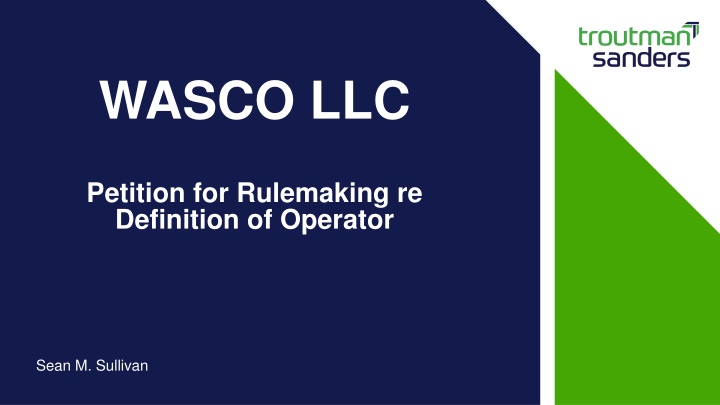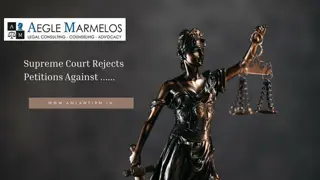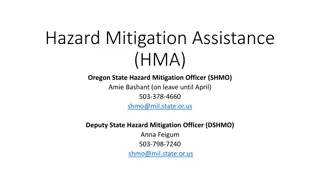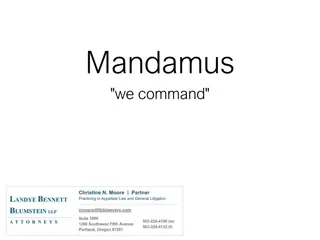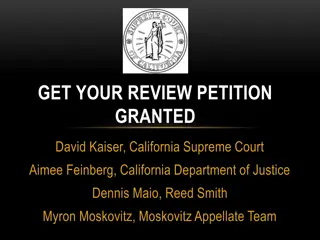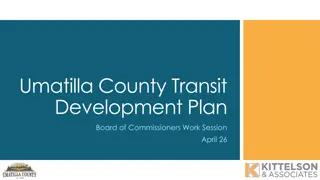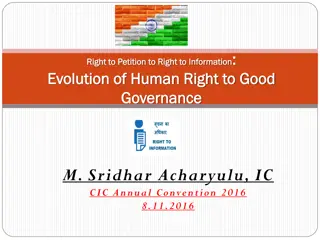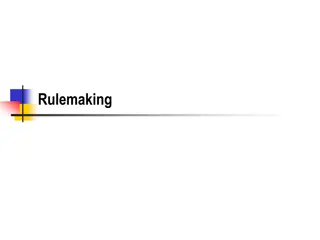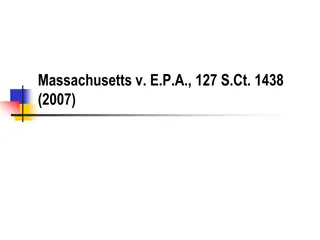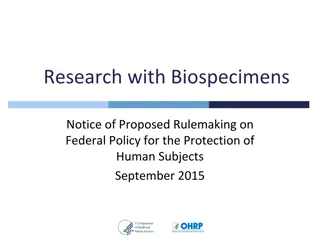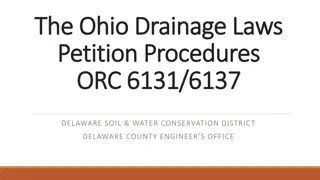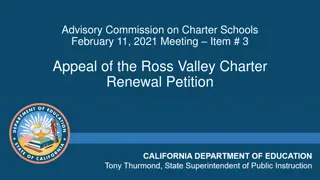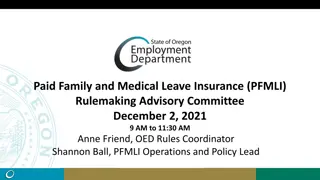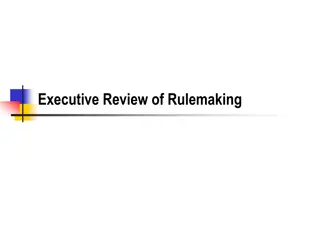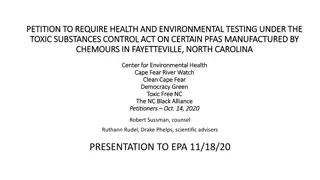WASCO LLC Petition for Rulemaking Re: Definition of Operator
Key factual background and legal analysis regarding WASCO LLC's petition for rulemaking to clarify the definition of "operator" in North Carolina, in response to DEQ's attempt to classify WASCO as one. The discussion includes implications of Bestfoods and CERCLA liability versus compliance under RCRA, highlighting the distinctions between the statutes and potential effects on regulatory enforcement.
Download Presentation

Please find below an Image/Link to download the presentation.
The content on the website is provided AS IS for your information and personal use only. It may not be sold, licensed, or shared on other websites without obtaining consent from the author.If you encounter any issues during the download, it is possible that the publisher has removed the file from their server.
You are allowed to download the files provided on this website for personal or commercial use, subject to the condition that they are used lawfully. All files are the property of their respective owners.
The content on the website is provided AS IS for your information and personal use only. It may not be sold, licensed, or shared on other websites without obtaining consent from the author.
E N D
Presentation Transcript
WASCO LLC Petition for Rulemaking re Definition of Operator Sean M. Sullivan
Topics Key Factual Background. Bestfoods and CERCLA Liability versus Compliance under RCRA. NCGS 130A-290(a)(21) defines, and limits, the meaning of operator in NC. Rulemaking is needed to provide clarity to the regulated community. Response to DEQ Opposition.
Key Factual Background Sole owner and entity with actual control over the property at issue is Dyna-Diggr, LLC. Dyna-Diggr acquired the property in December 2007. It has the absolute right to control all access to the property. Dyna-Diggr acquired the property as-is, where-is and with all faults. No one told WASCO about this transaction or its substance when it occurred. Prior to Dyna-Diggr acquisition, WASCO LLC had a contractual duty to Anvil Knitwear to pay for certain environmental costs at the site in the event former owner of the Property (Winston Mills) could not. Dyna-Diggr s acquisition of the property as-is, where-is effectively terminates WASCO s obligation to pay Anvil s environmental expenses on behalf of Winston Mills, because Dyna-Diggr agrees to assume all of those responsibilities. Problem is: Dyna-Diggr cannot afford to pay for the work DEQ wants it to do at the site. DEQ begins its attempts to call WASCO an operator in order to force WASCO to do the work Dyna- Diggr can t.
Key Factual Background At some point in the pre-litigation phase of the controversy, DEQ realizes that WASCO does not meet the plain-language of the definition of operator in 130A-290(a)(21). This is when DEQ begins citing to the definitions of operator in 40 CFR 260.10 and 270.2. Then, during the litigation, DEQ introduces a novel theory into the case Bestfoods. New theory appears around the time DEQ admits WASCO does not meet the plain language of the statutory definition of operator. DEQ s Bestfoods Theory Because WASCO is paying for an environmental consultant to perform limited, voluntary work at the site, and because WASCO is setting limits on what this consultant can or cannot do, WASCO is a party that exercises actual control over matters involving pollution or environmental compliance at the site. Therefore, WASCO meets the Supreme Court s test for operator liability under CERCLA and it should be deemed an operator for purposes of RCRA as well.
Bestfoods and CERCLA Liability versus Compliance under RCRA CERCLA and RCRA are very different statutes CERCLA establishes retroactive liability for releases of hazardous substances in order to require as many people as possible to contribute to cleanup costs at contaminated sites. Under Bestfoods, individuals and companies can both be liable as operators for the same contaminated site. For example, an individual employee can have operator liability under CERCLA for illicit dumping. RCRA is not a cleanup statute it is a compliance statute. It establishes substantive, forward-looking standards for the management of hazardous waste. The cleanup provisions of RCRA only become applicable through the obligation for certain types of facilities to have a permit. Identifying the owner and/or operator of the facility who must have the permit is different. You need a clear, specific standard to identify the entity subject to this obligation. If Bestfoodsdefines operator under RCRA, then any person or entity who actually controls matters related to pollution or environmental compliance at a facility must be on the permit or order.
Bestfoods and CERCLA Liability versus Compliance under RCRA The distinction between these statutes is why there is a different definition of operator in the Inactive Hazardous Sites Act than for the rest of the Solid Waste Management Act. Solid Waste Management Act uses the definition in 130A-290(a)(21). IHSA, the state s mini-CERCLA statute, explicitly incorporates the CERCLA definition of operator. Bottom Line: DEQ has imported the Bestfoods concepts of operator under CERCLA into a statute where they do not belong in order to expand the class of entities who must have a permit for the facility, thereby subjecting additional entities to the requirement to perform RCRA corrective action.
NCGS 130A-290(a)(21) defines, and limits, the meaning of operator in NC The statutory definition of operator is plain on its face. Entities who are principally engaged in or the person who is in charge of actual operation, supervision and maintenance of a solid waste management facility are operators that are subject to the compliance obligations of the Solid Waste Management Act. Note the definition also includes the person in charge of a shift or periods of operation during any part of the day. Expanding the definition of operator beyond someone principally engaged in or in charge of a facility expands compliance obligations to more individuals and entities than authorized by the General Assembly.
Rulemaking is needed to provide clarity to the regulated community Court of Appeals decision in WASCO stands for the proposition that any entity or person exercising control over matters involving environmental compliance or contamination at a solid waste management facility is an operator who must have a permit for those activities. Who is included? Person responsible for compliance with facility s Title V permit? Environmental consultant who performs groundwater sampling and manages the facility s compliance with 2L Rules? There is a defense to liability for some environmental consultants under CERCLA, but nothing like that under RCRA. Entity providing financial assurance for closure of a MSWLF? If the state calls in the financial assurance mechanism, the entity providing that assurance would likely want to supervise the closure activities it was assuring rather than writing the state a blank check. The statute provided clear guidance: Person "in charge of" actual operations Person "primarily engaged in"
Response to DEQ Opposition DEQ s three definitions of operator are only consistent if the broadest definition (Bestfoods) is controlling. The statute is the narrowest definition, though. DEQ s attempts to expand that definition are therefore ultra vires. Existence of Rules Review Process is Irrelevant. Rules review provisions do not alter WASCO s other rights under chapter 150B. Not surprising that the issue did not come up during rules review process, though. DEQ s actions in this case are UNPRECEDENTED. Except for one outlier, DEQ s other permits and alternate mechanisms under RCRA all reference the definition of operator in 130A-290(a)(21). No effect on status of other sites undergoing RCRA Corrective Action. WASCO s rulemaking petition speaks to WHO is required to have a permit for solid waste management facility. It does not speak in any way to WHETHER a facility must have a permit.
Response to DEQ Opposition WASCO s petition has no effect on joint and several liability among owners and operators of permitted facilities. Again, the question is WHO is subject to the requirement to have such a permit. Nothing in the petition prevents enforcement action against the entity holding title to a permitted facility or against the entity in charge of or principally engaged in maintaining or supervising a solid waste management facility. And, DEQ s historic practice has always been to rely on the definition in 130A-290(a)(21). Additional background on this point in WASCO s petition.
Conclusion RCRA is not a cleanup statute, it is a compliance statute. Corrective action only becomes relevant in limited circumstances. DEQ s attempts to expand the definition of operator in order to force more entities to obtain RCRA permits (and therefore perform corrective action) is beyond the plain language of 130A-290(a)(21). Result is significant uncertainty as to who needs a permit. DEQ s long-standing practice has been to rely on the definition of operator in 130A-290(a)(21), and its suggestions re the programmatic effects of the petition are untrue. Granting the petition simply returns DEQ to its historic practices. Allowing DEQ s expansion of the definition of operator to continue risks allowing the Department to subject other unsuspecting entities to the onerous requirements of RCRA corrective action.
